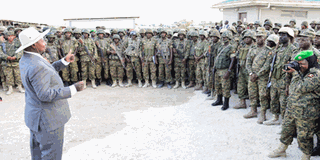Museveni’s remarks should worry us all

What you need to know:
- Our view: According to Article One of the Constitution, power belongs to the people, who exercise it through regular free and fair elections – through which they hire presidents and other leaders.
- The President, speaking during the NRM/A victory day anniversary in Masindi on Thursday, was quoted by this newspaper as saying he is a self-appointed freedom fighter fighting for himself and his beliefs, and that it would be illusory of anyone to imagine that they gave him a job or that he is their servant.
President Museveni used the occasion of marking 31 years in power to make a disturbing claim about his relationship with the people of Uganda.
The President, speaking during the NRM/A victory day anniversary in Masindi on Thursday, was quoted by this newspaper as saying he is a self-appointed freedom fighter fighting for himself and his beliefs, and that it would be illusory of anyone to imagine that they gave him a job or that he is their servant.
To refresh quickly, Mr Museveni fought a tightly contested campaign with Dr Kizza Besigye, at the end of which he was declared winner of the February 18, 2016 election, whose results Dr Besigye still disputes. Before that election, Mr Museveni had contested in five other elections – in 1980, 1996, 2001, 2006 and 2011.
In an election, of course, voters are supposed to have scrutinised the proposals of each of the candidates and zeroed in on who is best suited to serve as president. To whoever they choose to employ as president, the citizens cede power to form a government that monopolises the use of force and enforces laws, in addition to collecting taxes to finance public goods.
This is the essence of the ‘social contract’ put forward centuries ago by the French philosopher Jean-Jacques Rousseau, and upheld in Uganda’s Constitution of 1995, whose writing President Museveni superintended. According to Article One of the Constitution, power belongs to the people, who exercise it through regular free and fair elections – through which they hire presidents and other leaders.
President Museveni, being a student of political science, knows this. He, in fact, has on various occasions in the past underscored the need for democracy in the transformation of Uganda. Building a democracy was point No.1 in the Ten-Point Programme that Mr Museveni put forward while in the bush fighting for power in the 1980s.
After the writing of the 1995 Constitution and as preparations for the 1996 elections gathered steam, Mr Museveni said he was putting aside the military combat and changing into a kanzu to become a civilian leader. In fact, the Constitution does not allow serving soldiers to run for elective office; it only allows civilians who become servants of the people.
With this background in mind, it is disturbing to hear the President proclaim before the people of Uganda, who he beseeched for votes just a year ago, that he is neither their employee nor their servant. If Mr Museveni is neither of those to the people of Uganda, he cannot be accountable to them. And this does not auger well for good governance.
The issue: President Museveni on not being a servant
Our view: According to Article One of the Constitution, power belongs to the people, who exercise it through regular free and fair elections – through which they hire presidents and other leaders.


